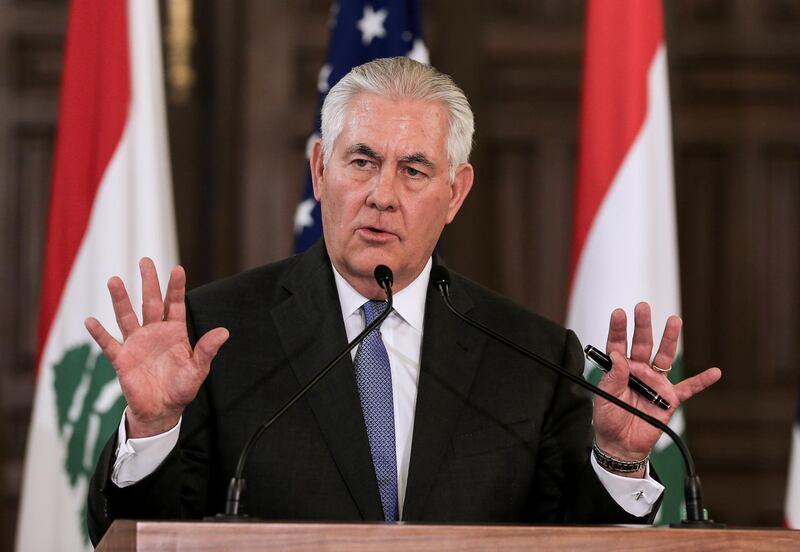US Secretary of State Rex Tillerson on a visit to Beirut on Thursday said Hezbollah's "growing arsenal" and "entanglement in regional conflicts" presented a danger to Lebanon.
Taking aim at the Iranian-backed militia and political party, part of Lebanon's government, he also slammed its ongoing support for the "barbaric" regime of Syrian president Bashar Al Assad in that country’s civil war.
Such backing was a violation of Lebanon's own dissociation policy, to spare it the negative repercussions of regional conflicts, Mr Tillerson said in the capital during a joint press conference with Prime Minister Saad Hariri.
"Hezbollah is not just a concern for the US. Their involvement in these far-off conflicts is felt here in Lebanon," he added.
Mr Tillerson also reiterated the US government's long-standing policy toward Hezbollah, which Washington more than two decades ago designated a terrorist organisation.
"We neither see or accept any distinction between its political and military arms," the top US diplomat said.
While Hezbollah leader Hassan Nasrallah has said the group would remove its fighters from Iraq, it is unlikely to draw down in Syria any time soon.
Policy towards Lebanon is a contentious matter within the US government. While at the same time levelling economic sanctions against entities and individuals associated with Hezbollah, a group it blames for attacks on the US embassy and Marine barracks in Beirut in the 1980s, the US has provided more than $1 billion in military aid to Lebanon's sovereign forces in the last decade. That has recently included aircraft capable of delivering missile strikes and Bradley armoured fighting vehicles.
____________________
Read more
UN chief calls for immediate de-escalation of violence in Syria
De Mistura warns Syrian situation is at its worst for years
____________________
Some US lawmakers have argued that fully cutting aid to Lebanon is the best way to deal with the growing regional influence of Hezbollah, while the argument that the US should provide aid to maintain even a small bit of influence in Lebanon continues to be the prevailing policy.
Among the issues that stoke support for Hezbollah in Lebanon are unresolved disputes over the two countries’ southern border. Tensions have risen in the last month after Israel challenged claims to offshore territory Lebanon has approved for petroleum exploration and began building a "security wall" along the inland portion of the line.
"We will continue to be very engaged with both parties, but we’ve asked no one to give up anything," Mr Tillerson said, appearing to contradict a media report that the US might end mediation efforts regarding the two countries' maritime border if Lebanon did not accept a resolution previously proposed by a US official in 2011.
Mr Tillerson said the US would also help mediate the inland dispute as well.
"Let's get the border agreed first, and then people can see if they need a security wall at that point," Mr Tillerson said.
Mr Tillerson also met with Lebanese president Michel Aoun, speaker of parliament Nabih Berri, and foreign minister Gibran Bassil.
"We had very good discussions. It is very important to have an agreement so that companies can begin work," he said of the petroleum rights dispute with Israel.
Mr Hariri, for his part, reiterated that Lebanon was unwilling to give up any part of what it claimed as its territory.
“What is ours is ours, and what is Israel’s is Israel's, and I think we’re trying to find solutions that will be fair to everyone – there are some new ideas," the Lebanese premier said, without elaborating.
Mr Tillerson's remarks came ahead of his trip to Turkey, scheduled for Friday, at which the nations' individual roles in the Syria conflict will dominate discussions.
The United States and Turkey have been at loggerheads in Syria over the role of Kurdish fighters.
Mr Tillerson denied that the US had provided heavy weapons to the YPG, a Syrian Kurdish militia that Turkey considers a terrorist group.





